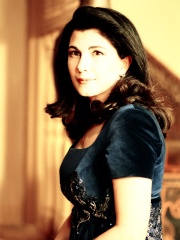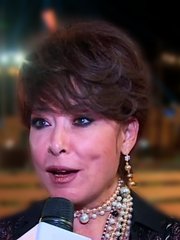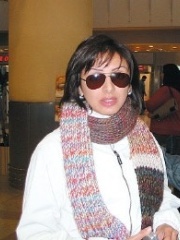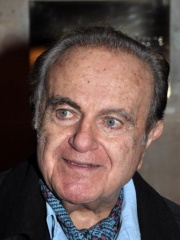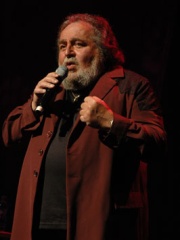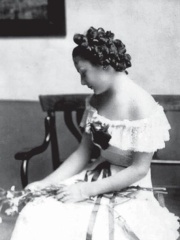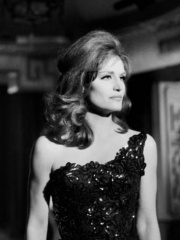
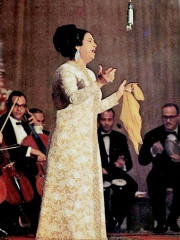
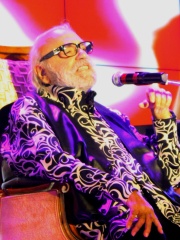
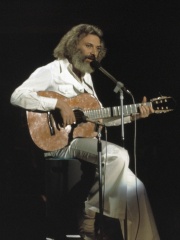
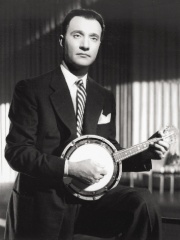

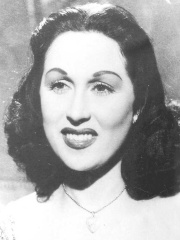
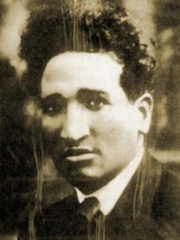
The Most Famous
SINGERS from Egypt
This page contains a list of the greatest Egyptian Singers. The pantheon dataset contains 4,381 Singers, 21 of which were born in Egypt. This makes Egypt the birth place of the 44th most number of Singers behind Albania, and South Africa.
Top 10
The following people are considered by Pantheon to be the top 10 most legendary Egyptian Singers of all time. This list of famous Egyptian Singers is sorted by HPI (Historical Popularity Index), a metric that aggregates information on a biography's online popularity. Visit the rankings page to view the entire list of Egyptian Singers.

1. Dalida (1933 - 1987)
With an HPI of 79.51, Dalida is the most famous Egyptian Singer. Her biography has been translated into 66 different languages on wikipedia.
Iolanda Cristina Gigliotti (Italian: [joˈlanda kriˈstiːna dʒiʎˈʎɔtti]; 17 January 1933 – 3 May 1987), professionally known as Dalida (French: [dalida], Italian: [daliˈda]; Arabic: داليدا), was an Italian naturalized French singer and actress. Throughout her international career, Dalida sold more than 140 million records worldwide. Some of her best known songs include "Bambino", "Ciao amore, ciao", "Gigi l'amoroso", "Il venait d'avoir 18 ans", "Laissez-moi danser", "Salma ya salama", "Helwa ya baladi", "Mourir sur scène", and "Paroles, paroles" featuring spoken word by film star Alain Delon. Initially an actress, she made her debut in the film A Glass and a Cigarette by Niazi Mustapha in 1955. A year later, having signed with the Barclay record company, Dalida achieved her first success as a singer with "Bambino". Following this, she became the top-selling recording artist in France between 1957 and 1961. Her music charted in many countries in Europe and Latin America. She collaborated with singers such as Julio Iglesias, Charles Aznavour, Johnny Mathis and Petula Clark. Although she made a few films during her career as a singer, she effectively reconnected with cinema with The Sixth Day, a film by Youssef Chahine released in 1986. In France, although the film was hailed by critics, it was a commercial failure. Dalida was deeply disturbed by the suicide of her partner Luigi Tenco in 1967. Despite this, she forged ahead with her career, forming the record label International Show with her brother Orlando, recording more music and performing at concerts and music competitions. After struggling with bouts of depression for many years, Dalida died by suicide from a drug overdose in 1987.

2. Umm Kulthum (1898 - 1975)
With an HPI of 79.44, Umm Kulthum is the 2nd most famous Egyptian Singer. Her biography has been translated into 101 different languages.
Fatima Ibrahim es-Sayyid el-Beltagi (4 May 1904 – 3 February 1975), known by her stage name Umm Kulthum, was an Egyptian singer and film actress active from the 1920s to the 1970s. She was given the honorific title Kawkab el-Sharq (Arabic: كوكب الشرق, lit. 'Star of the Orient'). Immensely popular throughout the Middle East and beyond, Umm Kulthum is a national icon in her native Egypt; she has been dubbed "The Voice of Egypt" and "Egypt's Fourth Pyramid". In 2023, Rolling Stone ranked Umm Kulthum at number 61 on its list of the 200 Greatest Singers of All Time. She is widely regarded as the Arab world's most distinguished singer of the 20th century. Her funeral in Cairo in 1975 drew a crowd of over 4 million people, the largest human gathering in Egypt's history, and one of the largest funerals in history, even surpassing that of former Egyptian President Gamal Abdel Nasser.

3. Demis Roussos (1946 - 2015)
With an HPI of 78.95, Demis Roussos is the 3rd most famous Egyptian Singer. His biography has been translated into 63 different languages.
Artemios "Demis" Ventouris-Roussos ( ROO-sohss; Greek: Αρτέμιος "Ντέμης" Βεντούρης-Ρούσσος, IPA: [arˈtemi.oz ˈdemiz venˈduriz ˈrusos]; 15 June 1946 – 25 January 2015) was an Egyptian-born Greek musician. As a band member, he is best remembered for his work in the progressive rock music act Aphrodite's Child, but as a vocal soloist, his repertoire included hit songs like "Goodbye, My Love, Goodbye", "From Souvenirs to Souvenirs" and "Forever and Ever". Roussos sold over 60 million albums worldwide and became "an unlikely kaftan-wearing sex symbol".

4. Georges Moustaki (1934 - 2013)
With an HPI of 70.54, Georges Moustaki is the 4th most famous Egyptian Singer. His biography has been translated into 40 different languages.
Georges Moustaki (born Giuseppe Mustacchi; 3 May 1934 – 23 May 2013) was an Egyptian-French singer-songwriter of Greek-Jewish origin. He wrote about 300 songs for some of the most popular singers in France, including Édith Piaf, Dalida, Françoise Hardy, Yves Montand, Barbara, Brigitte Fontaine, Herbert Pagani, France Gall, Cindy Daniel, Juliette Gréco, Pia Colombo, and Tino Rossi, as well as for himself.
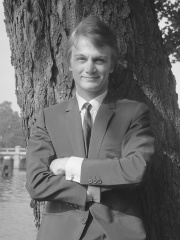
5. Claude François (1939 - 1978)
With an HPI of 67.62, Claude François is the 5th most famous Egyptian Singer. His biography has been translated into 40 different languages.
Claude Antoine Marie François (French pronunciation: [klod ɑ̃twan maʁi fʁɑ̃swa]; 1 February 1939 – 11 March 1978), also known by the nickname Cloclo, was a French pop singer, composer, songwriter, record producer, drummer and dancer. François co-wrote the lyrics of "Comme d'habitude" (composed by Jacques Revaux), the original version of "My Way", and composed the music of "Parce que je t'aime mon enfant", the original version of "My Boy". Among his other famous songs are "Le Téléphone Pleure", "Le lundi au soleil", "Magnolias for Ever" and "Alexandrie Alexandra". He also enjoyed considerable success with French-language versions of English-language songs, including "Belles! Belles! Belles!" (The Everly Brothers' "Made to Love"), "Cette année là" ("December, 1963 (Oh, What a Night)") and "Je vais à Rio" ("I Go to Rio"). Claude François sold more than 20 million records during his career, and 6 million since his death. He was about to embark for the United States when he was accidentally electrocuted in March 1978 at age 39. Former French President Valéry Giscard d'Estaing is quoted as saying Claude François was, to him, "the French equivalent of The Beatles, meaning the great talent of a generation".

6. Mohammed Abdel Wahab (1901 - 1991)
With an HPI of 66.18, Mohammed Abdel Wahab is the 6th most famous Egyptian Singer. His biography has been translated into 30 different languages.
Mohammed Abdel Wahab (Arabic: محمد عبد الوهاب), pronounced [moˈħamːæd ˌʕæbd‿el wæˈhæːb]; 13 March 1902 – 4 May 1991), was an Egyptian singer and actor best known for his romantic and Egyptian patriotic songs. He was known for his Egyptian nationalist and Arab nationalist and revolutionary songs like "O Egypt, Happiness Is Here", "The Call of Duty", "The Greatest Homeland", "The Rising Generation", "Egypt Called Us and We Have Answered", "Tell Egypt", "Patriotism Is My Obligation", "Voice of the Masses", "O Breeze of Freedom", and "Arms from My Country". He also composed the national anthem of Libya, which was adopted from 1951 to 1969, and again since 2011.

7. Amr Diab (b. 1961)
With an HPI of 64.03, Amr Diab is the 7th most famous Egyptian Singer. His biography has been translated into 49 different languages.
Amr Abdel Basset Abdel Azeez Diab (Arabic: عمرو عبد الباسط عبد العزيز دياب, Egyptian Arabic pronunciation: [ˈʕɑmɾe ʕæbdelˈbɑːsetˤ ʕæbdelʕæˈziːz deˈjæːb], born 11 October 1961) is an Egyptian singer, composer and actor. He has established himself as a globally acclaimed recording artist and author. He is a Guinness World Record holder, the best selling Middle Eastern artist, a seven-times winner of World Music Awards and five-times winner of Platinum Records. Named the "King of Arabic Pop", Rolling Stone ranked his song ‘Tamally Maak’ first on their list of "50 Best Arabic Pop Songs of the 21st Century".

8. Leila Mourad (1918 - 1995)
With an HPI of 61.64, Leila Mourad is the 8th most famous Egyptian Singer. Her biography has been translated into 23 different languages.
Leila Mourad or Layla Morad (Arabic: ليلى مراد; February 17, 1918 – November 21, 1995) was an Egyptian singer and actress, and one of the most prominent superstars in Egypt and the entire Arab world in her era. Born Lilian Zaki Ibrahim Mourad in the El Daher District in Cairo, she later changed her name to Leila Mourad as a stage name. Leila married three times and divorced three times. She died in 1995.

9. Sayed Darwish (1892 - 1923)
With an HPI of 60.19, Sayed Darwish is the 9th most famous Egyptian Singer. His biography has been translated into 18 different languages.
Sayed Darwish (Arabic: سيد درويش, IPA: [ˈsæjjed dæɾˈwiːʃ]; 17 March 1892 – 14 September 1923) was an Egyptian singer and composer who was considered the father of Egyptian popular music and one of Egypt's greatest musicians and seen by some as its single greatest composer.
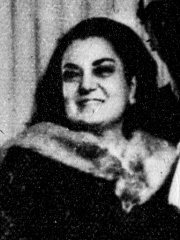
10. Gohar Gasparyan (1924 - 2007)
With an HPI of 60.05, Gohar Gasparyan is the 10th most famous Egyptian Singer. Her biography has been translated into 32 different languages.
Gohar Mikayeli Gasparyan (14 December 1924 – 16 May 2007, née Khachaturian), also known as the "Armenian nightingale", was an Armenian opera singer.
People
Pantheon has 21 people classified as Egyptian singers born between 1892 and 1990. Of these 21, 9 (42.86%) of them are still alive today. The most famous living Egyptian singers include Amr Diab, Majida El Roumi, and Sherine. The most famous deceased Egyptian singers include Dalida, Umm Kulthum, and Demis Roussos. As of April 2024, 3 new Egyptian singers have been added to Pantheon including Anoushka, Ramy Sabry, and Taco Hemingway.
Living Egyptian Singers
Go to all RankingsAmr Diab
1961 - Present
HPI: 64.03
Majida El Roumi
1956 - Present
HPI: 56.78
Sherine
1980 - Present
HPI: 52.10
Anoushka
1960 - Present
HPI: 50.08
Angham
1972 - Present
HPI: 48.90
Hisham Abbas
1963 - Present
HPI: 48.90
Ruby
1981 - Present
HPI: 44.12
Ramy Sabry
1978 - Present
HPI: 39.82
Taco Hemingway
1990 - Present
HPI: 36.92
Deceased Egyptian Singers
Go to all RankingsDalida
1933 - 1987
HPI: 79.51
Umm Kulthum
1898 - 1975
HPI: 79.44
Demis Roussos
1946 - 2015
HPI: 78.95
Georges Moustaki
1934 - 2013
HPI: 70.54
Claude François
1939 - 1978
HPI: 67.62
Mohammed Abdel Wahab
1901 - 1991
HPI: 66.18
Leila Mourad
1918 - 1995
HPI: 61.64
Sayed Darwish
1892 - 1923
HPI: 60.19
Gohar Gasparyan
1924 - 2007
HPI: 60.05
Guy Béart
1930 - 2015
HPI: 59.00
Richard Anthony
1938 - 2015
HPI: 57.59
Tefta Tashko-Koço
1910 - 1947
HPI: 56.25
Newly Added Egyptian Singers (2025)
Go to all RankingsAnoushka
1960 - Present
HPI: 50.08
Ramy Sabry
1978 - Present
HPI: 39.82
Taco Hemingway
1990 - Present
HPI: 36.92
Overlapping Lives
Which Singers were alive at the same time? This visualization shows the lifespans of the 12 most globally memorable Singers since 1700.

